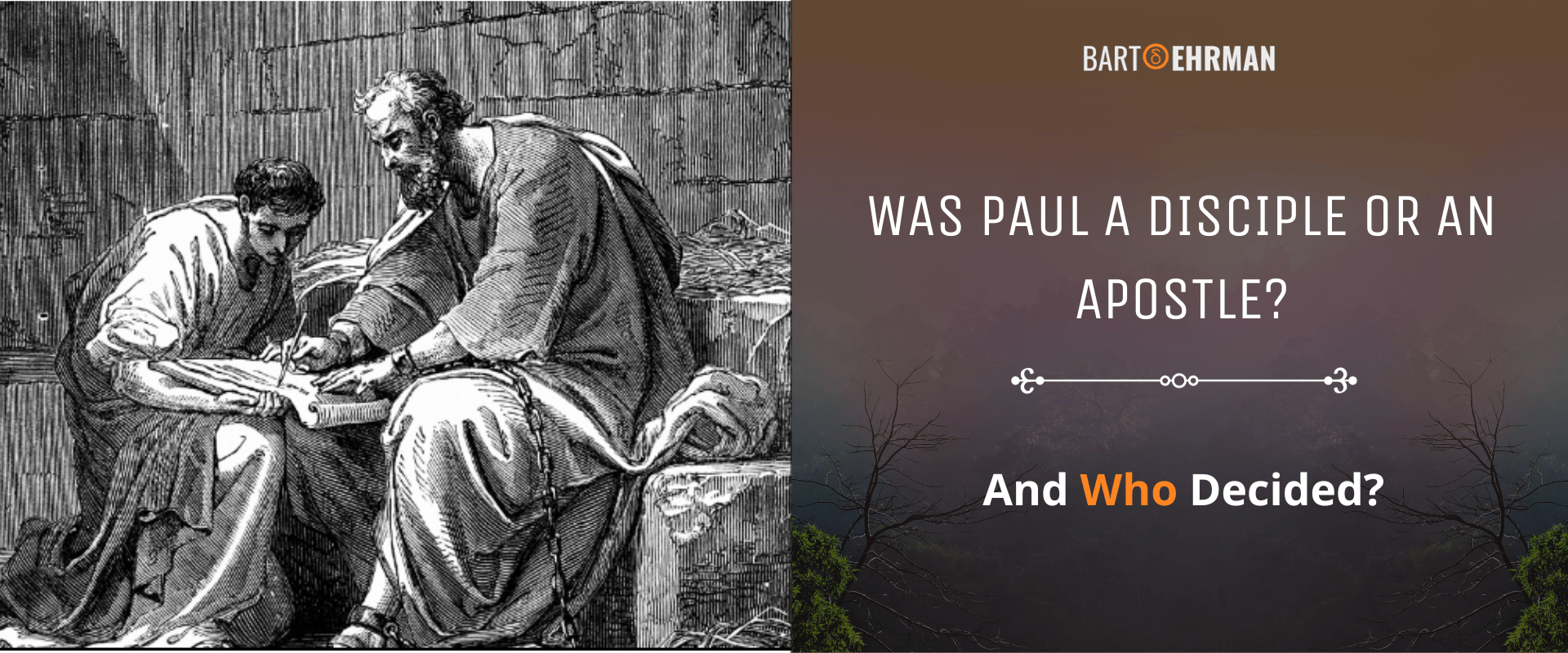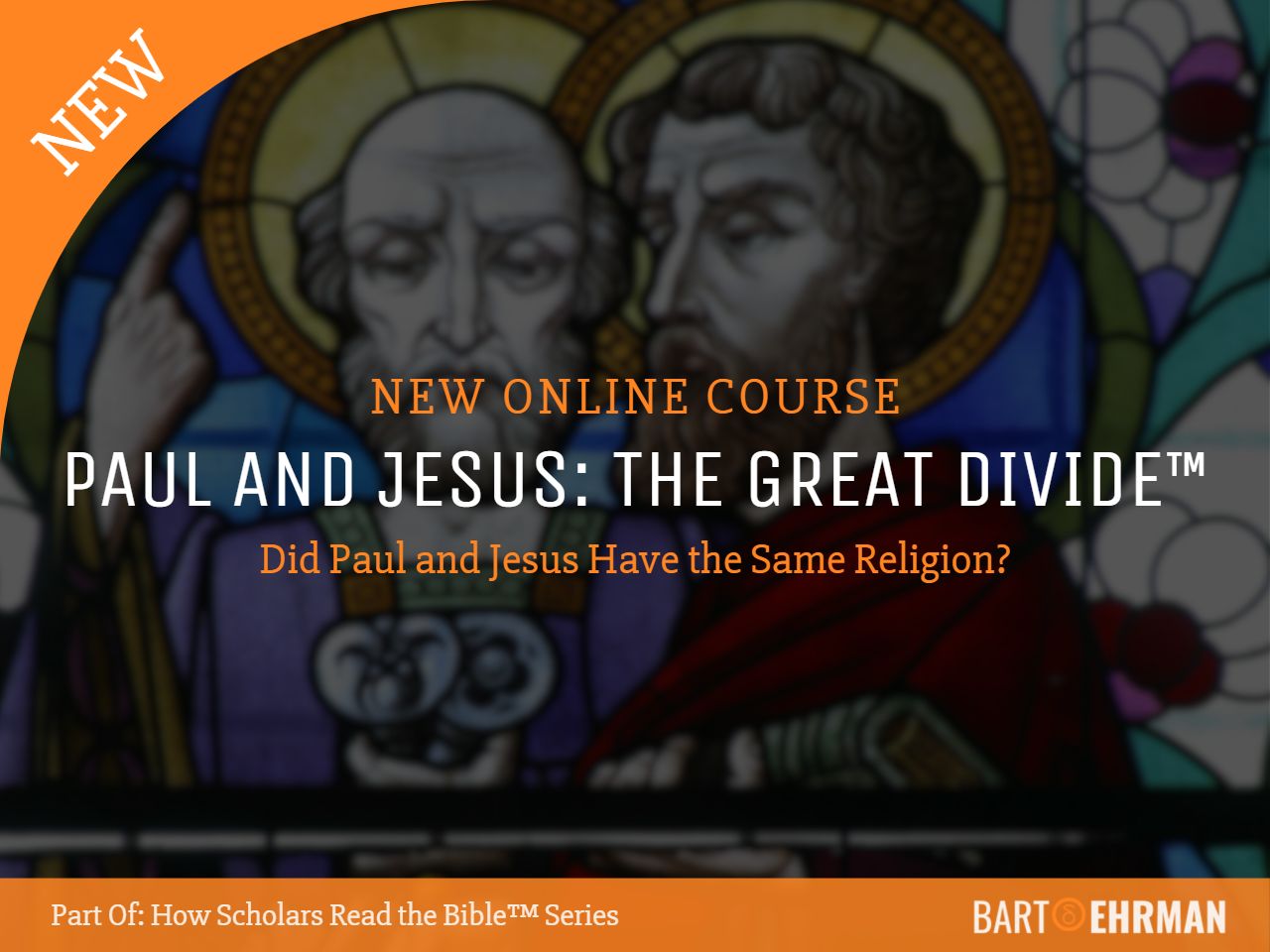Was Paul a Disciple or Apostle? (And Who Decided!)

Written by Joshua Schachterle, Ph.D
Author | Professor | Scholar
Author | Professor | BE Contributor
Verified! See our editorial guidelines
Verified! See our guidelines
Date written: December 7th, 2023
Disclaimer: The views and opinions expressed in this article belong to the author and do not necessarily match my own. - Dr. Bart D. Ehrman
The question of whether Paul was an apostle or a disciple is an interesting one. What is a disciple? What is an apostle? In this article, I’ll differentiate between the two terms. Then I’ll discuss which term defined Paul’s role and by what authority he got it.

First Things First: Definition of Disciple
The term disciple has become so common after two thousand years of Christian history that many never think about what it actually meant in Jesus’ time. So where does this term originally come from?
Remember that the entire New Testament was written in Greek. The Greek word we translate into English as “disciple,” is mathetes (our word “disciple” comes from the Latin equivalent discipulus). These days, some might consider a disciple a follower of any charismatic leader. However, when we look at how the word was used before the New Testament, another translation suggests itself: student.
This is illustrated in a passage in the philosopher Plato’s famous work The Republic where Socrates says, "this is the chief reason why it should be our main concern that each of us, neglecting all other studies, should seek after and study (mathetes) this thing.” Mathetes could be used generally to denote a diligent student.
More specifically, however, in ancient Greece a mathetes was the student of a philosopher. Famous Greek philosophers such as Plato and Aristotle, for example, had disciples, students who learned philosophy from them. However, there was a bit more to this learning than sitting in a classroom.
The Roman philosopher Seneca, a contemporary of Jesus and his disciples, had this to say about Cleanthes, a disciple of the well-known Stoic philosopher Zeno:
Cleanthes could not have been the express image of Zeno, if he had merely heard his lectures; he also shared in his life, saw into his hidden purposes, and watched him to see whether he lived according to his own rules. Plato, Aristotle, and the whole throng of sages who were destined to go each his different way, derived more benefit from the character than from the words of Socrates.
Clearly, a disciple was not simply someone who listened to lectures or read the writings of a philosopher. Instead, he lived day to day with his teacher, following the teacher’s example and, in some ways, actually trying to become a living reflection of that teacher.
This seems appropriate when we look at Jesus’ disciples. It’s clear from the stories in the New Testament that they were with him day in and day out, learning from him but also attempting to imitate his way of life.
What is an Apostle?
Since the disciples are also called apostles in the New Testament, let me briefly define apostle. The Greek word is apostolos, which means “one who is sent” or “a messenger.”
The ancient Greek historian Herodotus uses the term to mean messenger. Look at this passage, for example, in which the word apostolos doesn’t have any religious meaning at all:
Seeing this, the Lacedaemonians sent a messenger (apostolos) to enquire who they were and whence they came. They answered the messenger (apostolos) that they were Minyae, descendants of the heroes who had sailed in the Argo, and had put in at Lemnos and there begotten their race.
Herodotus wrote this work centuries before anything in the New Testament was written, and it’s clear that apostle was just an ordinary word for a messenger. So how did it come to take on such religious significance?
Jesus himself wouldn’t have used the exact term, since he spoke Aramaic and apostle is a Greek term. He may have used its Aramaic equivalent, however, which is shlikha (Shlee-khah). Why would he call his earliest disciples apostles?
Luke 10 gives us a clue:
After this the Lord appointed seventy others and sent them on ahead of him in pairs to every town and place where he himself intended to go… “Whenever you enter a town and its people welcome you, eat what is set before you; cure the sick who are there, and say to them, ‘The kingdom of God has come near to you.’”
Here we see both senses of the word apostle: “one who is sent” and “a messenger”. Jesus sends people out to other towns and he asks them to deliver a message. Since the message is of a divine nature, the word apostle eventually came to be associated with divinity among Christians.
Now that we understand the difference between a disciple and an apostle, which one was Paul (or was he both)?
Why Paul the Apostle and not Paul the Disciple?
Recall from my definition above what a disciple is: the student of a philosopher and/or a religious leader. Before his crucifixion, Jesus had 12 disciples. They lived with him day after day, listened to his teachings, and imitated his way of life. Being a disciple by definition involved living with the teacher. Does this describe Paul?
Paul never met Jesus while he was alive. While he was undoubtedly a contemporary of Jesus, he wasn’t born or raised in Palestine like Jesus and all his disciples. He never met Jesus and didn’t claim to have met him. Or at least not the earthly Jesus.
However, Paul believed that he had met the resurrected Jesus, the one who had been killed and then raised, exalted, and vindicated by God. Paul himself doesn’t say much about this meeting, although the book of Acts describes it like this:
Now as he was going along and approaching Damascus, suddenly a light from heaven flashed around him. He fell to the ground and heard a voice saying to him, “Saul, Saul, why do you persecute me?” He asked, “Who are you, Lord?” The reply came, “I am Jesus, whom you are persecuting. But get up and enter the city, and you will be told what you are to do.”
It's a dramatic scene depicted in many famous paintings. Paul is blinded after this scene, but then recovers and believes Jesus has commissioned him to preach to the gentiles.
Paul does describe a mystical experience he had which could be this same experience. This seems to have been a private encounter, one that could not be verified by other people. In fact, he says in 2 Corinthians 12:2-4 that he’s not even sure whether it was a physical experience or not.
However, his real feelings about his mission are often encapsulated in the greetings of his undisputed letters like this one in Galatians 1:1:
Paul an apostle—sent neither by human commission nor from human authorities but through Jesus Christ and God the Father, who raised him from the dead.
Note that Paul says he was “sent” not by humans but by the risen Jesus directly. A little later in Galatians 1:15-17 he elaborates on what Jesus sent him to do:
But when the one who had set me apart before I was born and called me through his grace was pleased to reveal his Son to me, so that I might proclaim him among the gentiles, I did not confer with any human, nor did I go up to Jerusalem to those who were already apostles before me…”
Paul says that the risen Jesus called him directly to preach the gospel of Jesus to the gentiles, which is why he travels throughout the Roman empire starting Jesus-following communities and writing letters to them addressing their problems and questions.
This is why Paul calls himself an apostle and not a disciple. He believes that the resurrected Jesus sent him as a messenger to the gentiles. But did other early Christians believe Paul was an apostle?

Who Didn’t Believe that Paul Was an Apostle?
Paul makes the same argument for his apostleship several times in the undisputed letters. Why? He makes this clear in 1 Corinthians 9:1-2:
Am I not free? Am I not an apostle? Have I not seen Jesus our Lord? Are you not my work in the Lord? If I am not an apostle to others, at least I am to you, for you are the seal of my apostleship in the Lord.
Who are these others who think Paul is not an apostle? We don’t have a lot of information about them but Paul does compare himself to them later in 2 Corinthians 11:22-23, sarcastically calling them “super-apostles”:
Are they Hebrews? So am I. Are they Israelites? So am I. Are they descendants of Abraham? So am I. Are they ministers of Christ? I am talking like a madman—I am a better one: with far greater labors, far more imprisonments, with countless floggings, and often near death.
Whatever the merits of Paul’s argument, it’s clear that some Jewish apostles claimed that Paul was not a valid apostle? Why? It may be precisely because unlike the 12 disciples, Paul didn’t know the earthly Jesus. Ultimately, we don’t know.
Conclusion: Was Paul a Disciple or an Apostle?
What is the difference between a disciple and an apostle? The word disciple is from the Greek word mathetes which meant a student, usually the student of a philosopher. The word apostle is from the Greek word apostolos meaning one sent out and/or a messenger. One who is a disciple can also be an apostle.
Was Paul a disciple or an apostle? Since Paul never knew the earthly Jesus, he never claimed to be his disciple. Unlike the 12, Paul never heard wisdom directly from the mouth of Jesus before his death. However, he believed that the resurrected Jesus had chosen him to take the message of the gospel to the gentiles. For this reason, Paul considered himself an apostle, although not everyone agreed with him.
Who made Paul an apostle? Paul believed that the risen Jesus had made him an apostle, sending him to preach the gospel to the gentiles. This was the basis for his claim to apostleship since no one else could verify his meeting with the resurrected Jesus.

